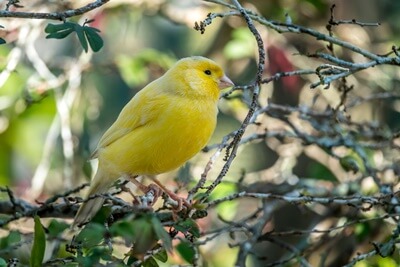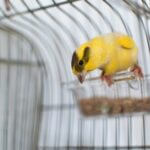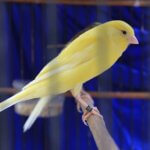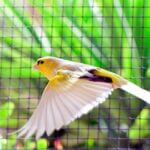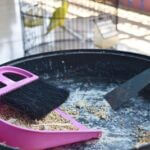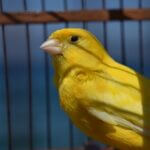Putting plants in your canary’s cage is safe and encouraged. Wild canaries are native to environments where they live among dense and varied foliage. Here, they find shelter, food, and comfort.
For example, they build nests at the tops of trees and feed on the wealth of seeds, flowers, and greens found in plants within their habitat.
The canopies protect them from harsh weather and sun exposure while hiding them from predators. So, adding plants gives canaries a sense of safety and security.
Plants also serve as visual and mental stimulation for canaries. They not only replicate the birds’ natural environment but give them leaves to nibble on, areas to perch on, and spots to rest.
What Plants Can I Put in A Canary’s Cage?
While plants are recommended for canary habitats, certain species are unwise to include.
For example, poisonous plants should be avoided, as canaries often peck at and eat the leaves, and doing so on an unsafe plant could lead to illness and even death.
Likewise, you must account for how fast the plants grow. Any which can outgrow the cage will leave your canary feeling crowded. Even if that were tolerable, you would need to remove the plant before it grew around the cage bars.
Maintenance is another important factor. Fast-growing plants need to be watered and pruned often and may create a mess to clean up. This prevents them from being a low-effort decoration and piece of enrichment for your canary, instead turning into a hassle.
Here’s a list of canary-safe options to help you choose the right plants. Each plant is non-toxic and matures slowly enough to fit with a canary’s cage.
1/ Boston Fern
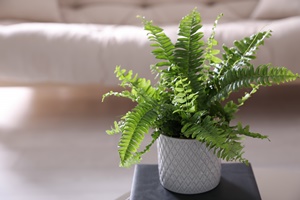
The Boston fern is a popular species, commonly owned as a houseplant. It’s native to many tropical regions worldwide and thrives best in swampy or humid areas.
It has green, sword-shaped foliage that branches out into tiny leaflets, making it ideal to be a shade plant in a canary’s cage.
Like other fern species, the Boston fern grows slowly and can stay short for many years. So, it’s easy to maintain, as it won’t demand regular pruning. Canaries enjoy its dense foliage and leaf shapes, allowing them to hide in the branches or nibble on the greens.
However, the Boston fern still needs a little care to remain in good condition.
Unless your home reaches 80% humidity on its own, you must mist the plant once or twice a week or provide a tray of water covered by pebbles to offset its needs.
This shouldn’t bother your canary and may allow it to bathe when you’re misting the plant.
2/ Spider Plant
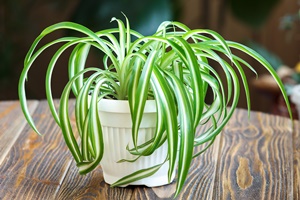
Spider plants are herbaceous, perennial plants characterized by long, green, and white striped leaves. These can grow up to 12-18 inches long.
According to the University of Agriculture and Technology, spider plants are rich in vitamins A and C.
Spider plants are easy to maintain. The most demanding aspect of care involves regular watering to prevent the leaves from drying up.
You also need to maintain a temperature of around 70 degrees, or the leaves may turn brown. However, the average canary is happy at 60-70 degrees Fahrenheit, so this won’t be hard to accomplish.
3/ Aloe Vera Plant

Aloe vera is a succulent plant that’s not only safe and non-poisonous for canaries. It provides numerous health benefits, such as easing digestion, boosting eye health, and rounding out vitamin needs.
According to the Asian Journal of Medical and Biological Research, aloe vera can also help your canary manage its weight.
Aloe vera is easy to grow and maintain, as it doesn’t require much water to thrive. Routine watering isn’t recommended, as it may cause the roots to rot.
Aloe vera plants require lots of natural light without direct exposure to the sun to remain healthy and in good condition. This suits the placement of most canary cages.
4/ Jade Plant
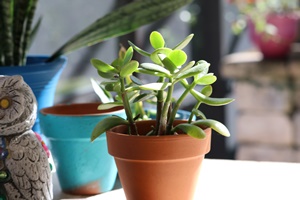
Jade plants, also known as money plants, are best recognized by their smooth, succulent, oval-shaped leaves and thick stems.
These plants are highly resilient and can survive for many years with minimal care. That’s ideal as a low-maintenance plant dealing with a canary’s eager pecking.
Like most succulents, jade plants don’t require frequent watering. So, you should only water them when the top layer of the soil becomes dry.
However, the most critical part of caring for jade plants is ensuring they receive ample sunlight, as they can become stunted when grown in dark environments.
If your canary cage doesn’t receive enough natural light, you may need to remove the plant, allow it to thrive near a window, and return it to the cage at intervals.
5/ Dandelions
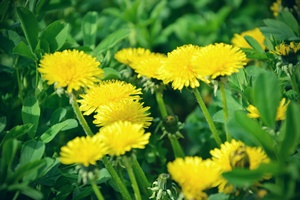
Dandelions are perennial, flowering herbs known for their large, bright-yellow flowers. They grow naturally in many parts of the world and are usually considered weeds, which canaries may feed on in the wild. Dandelions are good sources of the following:
- Vitamin A
- Vitamin C
- Vitamin E
- Vitamin K
- Calcium
- Potassium
- Magnesium
- Iron
Dandelions are resistant to most pests and diseases, which makes them fairly problem-free.
However, to ensure your plants thrive, grow them in a location that receives ample sunlight (8-10 hours a day). You should also water them regularly, as these plants can dry up quickly in water-deficient soil.
6/ African Violets
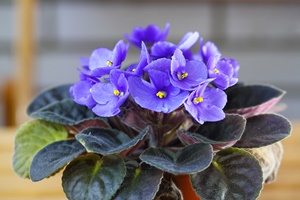
African violets are low-growing plants recognizable by their dark green leaves and deep purple, blue, or pink flowers.
While they perform well when housed indoors, they require special care and maintenance to remain healthy. While that may sound off-putting, African violets can survive for up to a decade when cared for properly.
For instance, you should only water the base of the plant and avoid splashing water on the foliage, as this can cause them to rot. That works fine in canary cages, as you shouldn’t leave the area overly or regularly damp, or else it may affect the canary’s respiratory system.
7/ Orchids
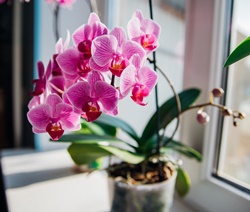
Orchids are flowering plants prized for their colorful and fragrant flowers. Most varieties of orchids require well-drained soil and regular watering for good health.
However, watering should be done sparingly to prevent the soil from becoming water-logged, damaging the plant’s roots.
Keeping your orchids in a location that receives bright yet indirect light is also important. Keeping your plants near east-facing windows is ideal since they allow them to get mid-morning sunlight.
They’re safe for canaries to peck at, with popular varieties including:
- Christmas orchids
- Brazilian orchids
- Cocktail orchid
- Moth orchids
8/ Miniature Roses
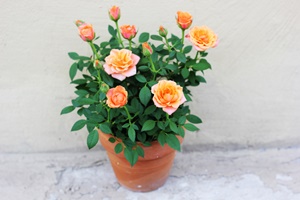
Many types of roses can be grown indoors under the right conditions. Miniature roses are ideal for canary cages since they provide a natural look and are small enough to grow in limited spaces.
The key to growing roses indoors is ensuring they receive plenty of light. As a general rule, provide 6 hours of sunlight daily. Rose petals are high in antioxidants and minerals and are known to improve digestion in canaries.
9/ Zebra Plant
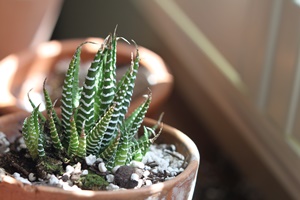
Zebra plants are medium-sized, herbaceous plants characterized by dark green foliage with white veins. Canaries often love the texture of their leaves and perch on their inner stems.
They thrive in humid temperatures between 68 and 75 degrees. Although they can be grown in various soils, they prefer well-drained and moist soils.
However, avoid overwatering, as this can damage the roots. It’s also recommended to keep them in environments with lots of indirect natural light, which canaries also appreciate.
10/ Yucca
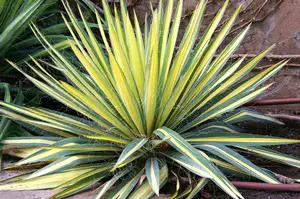
Yuccas are a variety of evergreen shrubs characterized by long sword-like leaves and whitish flowers. They perform best in loose, well-drained soils and bright, indirect natural light.
Yuccas are sensitive to excess watering, as their rhizomes can hold lots of water, so it’s advisable to water them once every 10 days. Canaries often love pecking at their stems and leaves.

